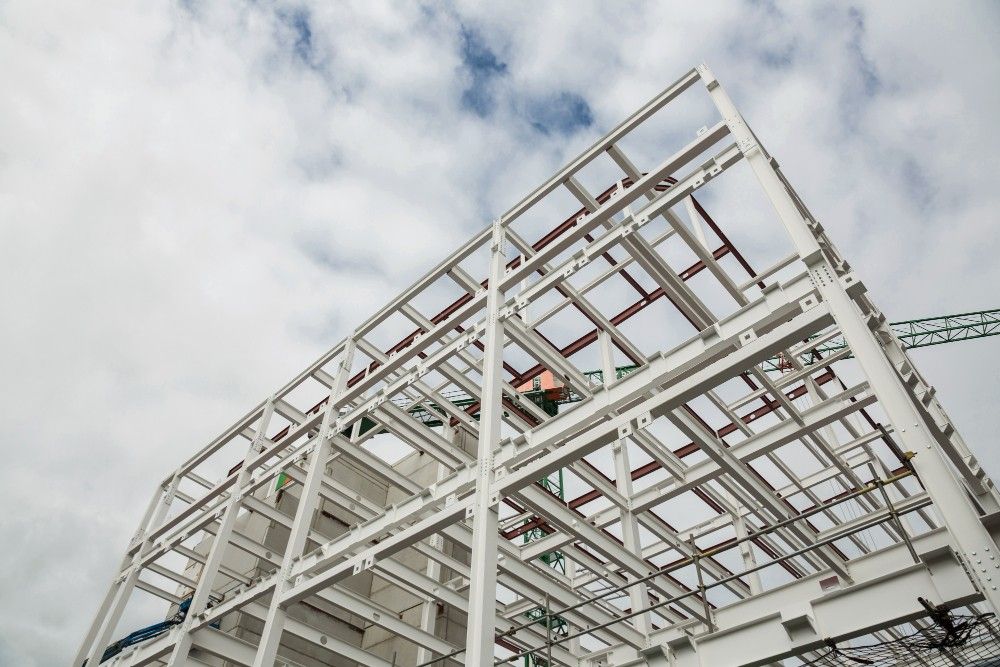
How Modular Construction is Shaping the Future of Industrial Facilities?
Modular construction is significantly transforming the industrial construction sector, offering a range of benefits that are reshaping how factories, warehouses, and manufacturing plants are designed and built.
In this article, we will explore the impact modular construction is having on industrial facilities, its advantages, challenges, and how India is adopting it.
What is Modular Construction?
In modular construction, sections of a building, also known as modules, are manufactured in a controlled factory setting before being assembled on site. With modular construction, most of the work is done off-site, reducing delays and inefficiencies compared to traditional construction.
Traditionally, this technique has been used in commercial and residential construction. However, its advantages are now being recognized in industrial settings as well.
Why Modular Construction is Gaining Popularity in Industrial Facilities?
1. Faster Project Completion
One of the biggest advantages of modular construction is the significant reduction in project timelines. Since modules are prefabricated in a factory while site preparation occurs simultaneously, construction time can be reduced by 30-50% compared to conventional methods.
This is particularly beneficial for industries that require rapid expansion or need to set up production lines quickly to meet market demand.
2. Cost-Effective Approach
Traditional industrial construction can be costly due to labor expenses, material wastage, and extended timelines. Modular construction optimizes costs by reducing labor requirements, improving material efficiency, and allowing a more predictable budget.
For businesses looking to scale operations without excessive capital expenditure, modular construction offers a financially viable alternative.
3. Improved Quality Control
Since modular units are produced in a controlled factory environment, quality control measures are more stringent compared to on-site construction.
Factory-built modules undergo rigorous inspections, ensuring compliance with industrial standards before being transported to the site.
This results in high-quality structures that are durable, precise, and free from common construction defects.
Key Applications of Modular Construction in Industrial Facilities
1. Manufacturing Plants
Modular construction is ideal for manufacturing plants that require quick setup and scalability. Companies can expand operations in phases by adding prefabricated modules rather than undergoing lengthy construction periods.
2. Data Centers
With the growing demand for digital infrastructure, modular data centers have become a preferred choice for technology companies. Prefabricated server rooms and control centers ensure that businesses can deploy IT facilities faster while maintaining energy efficiency.
3. Warehouses and Logistics Centers
Supply chain disruptions highlight the need for flexible and rapidly deployable storage facilities. Modular warehouses provide the advantage of faster assembly, allowing businesses to respond quickly to market needs.
Challenges of Modular Construction in Industrial Projects
While modular construction offers many advantages, there are also challenges that should be addressed.
1. Transportation and Logistics
Moving large prefabricated modules from the factory to the construction site can pose logistical challenges, especially in regions with inadequate infrastructure. Companies must carefully plan transportation routes to avoid delays and damage to the modules.
2. Limited Customization
While modular construction allows for some level of customization, it may not be as flexible as traditional construction methods. Industrial facilities with highly specialized requirements may need to balance prefabrication with on-site modifications.
3. Initial Investment
Although modular construction saves costs in the long run, the initial investment can be higher due to factory setup and transportation expenses. Businesses must weigh upfront costs against long-term savings when considering modular solutions.
India’s Growing Adoption of Modular Industrial Construction
India is witnessing a growing shift toward modular construction in industrial projects. With the government’s push for infrastructure development and the ‘Make in India’ initiative, businesses are increasingly exploring prefabrication for efficiency and sustainability.
VMS Consultants, a leader in engineering and project management, has helped industries integrate modular construction into their facility development.
Future Trends in Modular Industrial Construction
1. Integration of Smart Technologies
The rise of Industry 4.0 is influencing modular construction, with automated systems, IoT sensors, and AI-powered analytics being incorporated into prefabricated modules. Smart factories will soon feature pre-installed automation systems, making deployment even faster.
2. Sustainability and Green Building Practices
Modular construction aligns with sustainability goals by reducing material waste, energy consumption, and carbon footprint. As businesses aim for greener operations, prefabricated structures will continue to be a preferred choice for environmentally conscious industries.
3. Hybrid Construction Models
In some cases, businesses may opt for a hybrid approach where modular and traditional construction methods are combined. This allows for greater flexibility while still benefiting from the efficiency of prefabrication.
Conclusion
Modular construction is transforming the way industrial facilities are built, offering a faster, cost-effective, and high-quality alternative to conventional methods. As India adopts this trend, businesses can improve efficiency and achieve their growth goals with prefabricated solutions.
For expert guidance in industrial facility development, VMS Consultants provides comprehensive engineering, architecture, and project management services.
Partner with VMS to bring efficiency and innovation to your next industrial project.



